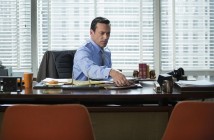The Americans, Season Two, Episode 13, “Echo”
May 21, 2014, 10:00 p.m. (EST), FX
It is a tenant of the American Dream that every parent wants better for their children than they have had, wants to improve the lives of their offspring as much as they can. This isn’t an exclusively American idea (I’d venture everyone whose ever had a child wants the same), but it is an explicitly American one. It is part of the core agreement we make with ourselves, one of the central ideals around which we build our conceptions of success and family. One of the things The Americans has always been about is the allure of America even to two people who are at war with our country and what it stands for. “Echo” shows us just how deeply this idea of wanting better for their children has taken root in the illegals within the United States, and just how dangerous that desire can be in their line of work. Every parent wants more for their children, just as every child eventually discovers they have in many ways become their parents. There is a great tension between these truths. Sometimes that tension forces us to strive. Other times, it forces us to snap.
Season two has been about the relationships between parents and children, and about the dawning awareness of adolescence, and each tiny conflict, each small step along Paige’s path leads to those final minutes, where Claudia reveals that the Center wants to recruit Paige as a second-generation illegal, the sort of operative that could infiltrate the CIA or the highest levels of government without raising any red flags (I’m not sure how plausible that is, since presumably the CIA does background checks into parents of any recruits, but I’ll assume Claudia knows more than me about the strengths and weaknesses of the Jennings’ assumed identities). The season’s initial shock was the death of Emmett and Leanne, a moment that left Philip and Elizabeth wondering about the risk their line of work posed to their families. That came soon after Paige’s snooping in the first season’s finale, which hinted that threats would not only come from outside the Jennings family. These two strands come together, then, in the revelation that the Center wants to weaponize their children in the war against America. The threat isn’t just inside their house, it is one they are expected to cultivate. As children age, they become their own people, with their own thoughts, feelings, and beliefs. That makes them harder to predict. It also makes them harder to control. We’ve been talking about this all season long, and yet this uncertainty is built into the core of the season’s structure. Philip and Elizabeth have lost touch with who Paige is and who she is becoming, and now they are faced with the very real possibility she will become something just like them, something as cold, calculating, and dangerous to her family as they have had to become.
“Echo” begins with Paige taking a stand, intercutting her nuclear protest with her parents’ race to retrieve the stealth paint in a sequence that explicitly ties their aims and methods together. The finale’s title is appropriate for the way Paige’s beliefs, fears, doubts, and frustrations are echoed, not just through her parents (by helping the Soviets attain stealth technology, Philip and Elizabeth are, in part, helping to maintain the status quo, ensuring an equilibrium that will keep the war cold and keep the US from using nuclear weapons), but through nearly every character. Larrick’s petulance in his final scene initially felt unearned to me (he has killed his way through half of the domestic Soviet spy network just to handcuff two of its operatives and drop them off somewhere?), but it in fact mirrors how fed up Paige is with her parents. Jared’s righteous fury, his blind belief and the power of it to drive him to action mirrors Paige’s spiritual awakening, though her parents miss that Paige is less looking for a cause than has already found one.
A parent’s job is to raise their children to prepare them for life in the world. Mostly, that means instilling beliefs in them until it means teaching them to think for themselves. A young child, like Henry, for instance, can be seen as basically and echo of his parents, parroting what they’ve taught him and believing what they tell him to believe. When you are young, your moral code is mostly instilled in you by your parents and the parables they pass on to you; only once you are older have you garnered enough experience to develop situational morality. But eventually, the echo fades away, repeating back no more. Children grow up, they learn to think for themselves, and they don’t always think or feel or behave exactly as their parents have taught them. It’s a point of pride, but also, I imagine, a deeply terrifying experience to discover your children aren’t echoes anymore, aren’t as malleable nor as tied to your vision of what they should be. If your job is done right, they likely adhere to many of your teachings and will be fine members of society. But they won’t be clones of you, they won’t do exactly as you might in any situation. They aren’t your echoes, they never have been. No, you, the parent, is the real echo, strong at first in your ability to guide and shape your children, but growing fainter over time as they learn to live for themselves.
What that really comes down to is one of the things The Americans comes back to most often: the idea of the choices people make and their consequences. Every bit of intelligence that Philip and Elizabeth extract from people comes from their ability to extract information, to play on people’s desires and secrets and regrets. You can’t blackmail someone who hasn’t made a bad choice, and you can’t turn someone who isn’t willing to do what you ask. This is, essentially, what we have been watching with Stan all season. Stan made a series of choices that backed him into a corner. He made his own bed, and in “Echo,” he was resigned to lying in it. Until he seemed to realize that what has damned him could also be his salvation. His choices put him into a corner, but the forces being exerted on him were all due to his own decisions. Stan could choose to betray his country for the woman he loved, to blow up his life (and maybe the world) because of an affair. But he could also choose to draw a line in the sand, to go no further. He could deprive the Soviets of their power over him by simply refusing to give in. Stan chose to call their bluff, losing Nina but saving himself from being a cog in a very dangerous machine.
These choices are what make us into people. They are what ensure we are more than just echoes of what we’ve been taught, what we’ve been told, what we’ve been ordered to do or to refrain from doing. Our choices are the sources of our greatest triumphs and our most crushing defeats. They can save us, like they saved Stan tonight, or doom us, like they doomed Jared, or Larrick, or Fred, or any number of characters we watched die this season. We can choose who we will be, what we will do, how we will effect the world around us or let it pass us by. It can be the scariest thing in the world, but also, it can be the most beautiful. The Americans populates its world with real people who think, and feel, and believe, and make mistakes. Sometimes they stumble and sometimes they soar. But always, they choose for themselves.
The Roundup
- -“What’s going on with you?” “Are you kidding?”
- -“If she said one more thing about non-violent resistance, I was gonna punch her in the face.”
- -“Don’t tell her ‘I love you,’ so much. A Russian woman doesn’t like that. She won’t respect you.”
- -“What we do, its for something greater than ourselves.”
- -“Paige is your daughter, but she’s not just yours. She belongs to the cause, and to the world. We all do.”
- -“It would destroy her.” “To be like us?”
The finale’s title is appropriate for the way Paige’s beliefs, fears, doubts, and frustrations are echoed, not just through her parents, but through nearly every character. [/notification]
-
GREAT




